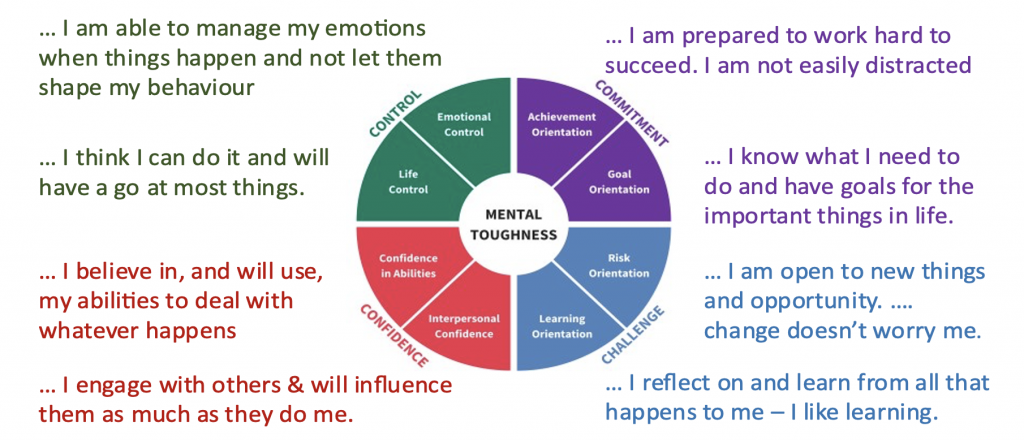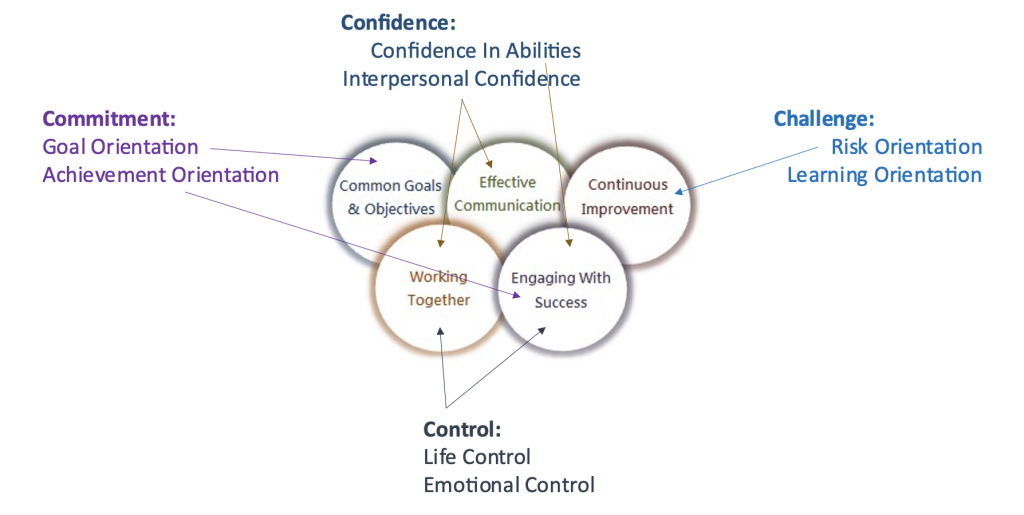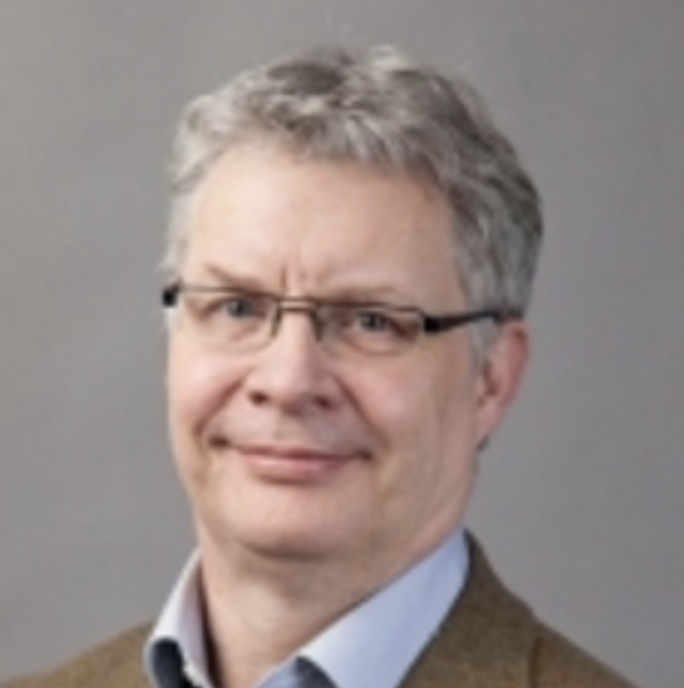Mental toughness and mental sensitivity describe how we think when events occur. They are at opposite ends of a continuum, and understanding ourselves – and where we sit on this continuum – will have an impact on how we lead, manage and work with teams, according to Doug Strycharczyk, Peter Clough and John Perry
Mental toughness is an important personality trait which describes how we respond mentally when things happen us or around us. Most are very familiar with behavioural aspects of personality – how we act when events occur. Mental toughness describes how we think when events occur. And this has a big impact on our behaviour – it’s one of its most important influences. It helps us to understand why we respond to events the way we do.
It is important to recognise that mental toughness is a continuum – with higher levels of mental toughness at one end and lower levels, called mental sensitivity, at the other end. The opposite of mental toughness is NOT mental weakness – it is sensitivity. The Four Cs model is not designed to judge individuals, rather it is designed to help people understand themselves
Peter Clough, in 2002, identified a four-construct model which began to provide an explanation. He found that Control, Commitment, Challenge and Confidence – the so called Four Cs – were the pillars of the concept. Since then, ongoing research and application in the worlds of education, business, health, social mobility as well as sport has led to identifying eight factors which underpin the Four Cs.
This enables us to understand our mental responses to a good level of granularity. Our individual response will be just that – individual. Each of us will respond differently to the same situation and that difference can be explained by our level of mental toughness or mental sensitivity on one, or more, of the eight factors.
Mental toughness explains my approach to my life and my work: each factor explains to what extent…

Mental toughness and mental sensitivity are positions on a continuum.
At one end you have mental toughness. Generally, this indicates a positive response to events for each scale. The mentally tough are often described as ‘comfortable in their own skin.’ Stoical in nature, they expect life to have its ups and downs and, mostly, take these in their stride.
At the other end you have mental sensitivity which describes a cautious or, sometimes, negative response to events. These may have the same level of skill, experience and education but will respond to those ups and downs differently. They feel every bump on the road through life. These can stop them in their tracks and they may take time to recover fork setbacks.
Most of us are a mixture of both.
What difference can they make? The role of self awareness
In general, studies show that mental toughness correlates strongly with performance, wellbeing, agility and aspiration.
However, mental toughness and mental sensitivity are not necessarily synonymous with strengths and weaknesses. It is possible to be mentally tough and struggle and to be mentally sensitive and succeed. The key is self awareness.
Without self-awareness the mentally tough can think they can do it all… but they can’t. Worst still they can deal with other’s negatively ‘I can do it. Why can’t you?’. In a team setting they can be so focused on what they can do that they fail to realise that others can contribute but not at the same level they themselves do.
With self-awareness, the mentally sensitive become aware of the potential consequences of their mental sensitivity. This enables them to either develop their mental toughness or develop coping mechanisms to mange any disadvantage. In a team setting they can be reluctant to engage with others unless they understand where that comes from and they adopt approaches to overcome this.
Indeed, the mentally sensitive can have advantage in some settings. They can be less likely to ‘burnout’ because they sense wo overload in a way that the mentally tough often don’t. They can also bring a different caring approach to situations. They can also be creative in a different way the generally more mentally tough colleague.
This is bringing an important dimension to understanding individuals and groups and their development. The challenge is avoid being pejorative as much as possible. There is a tendency to see things in terms of black and white, strengths and weaknesses. The reality is we are all complex and a mixture of many qualities. We are who we are and the real challenge is to be the best version of ourselves that we can be. Or even the best team or group of people that we can be.
How do mental toughness and mental sensitivity relate to team working?
We can see teams as a composite of two things:
- The people who make up the team
- The way the team normally works – there are many types of teams.
For a more complete solution to the challenge of team working it is often necessary to address both.
If we look at the diagram above we can see that each of the eight factors is describing a different aspects of the way an individual approaches tasks and working with others. On the face of it the mentally tough individual who responds pretty much the way described should be a very valuable team member.
Lack of self-awareness about their potential impact on others and they can become ineffective team members and squander their assets. As noted earlier some can set out to do that is beyond they capability; they can over commit and work too hard, they can take risks and go for things with which other team members are not comfortable and, if over confident, can intimidate others.
One of the challenges in developing self-awareness about this aspect of our personality is that we are dealing with something that is inside our heads. Its invisible to others and very often to ourselves. The framework helps us to understand what we should be considering.
The first step is to diagnose what the current situation looks like and where explanation for underperformance can be found. This is most often the role of a team coach, a facilitator or a team leader. The framework described briefly in the diagram provides a frame of reference for this.
AQR International with the support of Peter Clough and John Perry, have developed family of valid and reliable psychometric measures. The MTQPlus is the latest iteration, bringing together all we have learned to this point. This brings the capability to assess objectively relevant (to the framework) qualities of each team member and the same for the group. Effectively a training needs analysis.
By managers and peers undertaking this mental toughness assessment, they become aware, not only of their own mental toughness profile, but recognise that their colleagues, too, have a wide variety of profiles.
A simple technique anyone working in or with a team can use is to take a brief moment before making a request or directing an instruction and ask ‘how might this be perceived by the most mentally tough and most mentally sensitive in the team?’. As understanding of mental toughness improves, the same person might consider a more nuanced version of this question, such as ‘how might those with lower levels of goal orientation respond to this request?’.
The MTQPlus is particularly useful in a team setting. Test results can be aggregated for a group which, when examined and analysed, can give valuable insights into aspects of the team culture in terms of its resilience and its positivity. This can further be analysed in a number of ways – by age, sex, length of membership of the team, etc which will often indicate further why the team is functioning well or perhaps not. It also brings the potential for measuring change and where that change has occurred … and how it’s made a difference to teamworking and productivity.
Mental Toughness factors also have a bearing on the way a team has to work. AQR’s own research found that other areas are key to performance for a highly effective team:
Common goals – knowing what these are and committing to them
Dealing with problems and a continuous improvement ethos – avoiding complacency and finding solutions to prevent avoidable problems resurfacing
Working effectively with one another – – understanding what each brings to the team and how that can be optimised – already explored above.
Celebrating success – understanding what success look like and enjoying the sense of satisfaction that derives from this – an important source of motivation
And connecting all of these…
First class communications – sharing information freely and listening to others’ contributions.
The diagram below shows how how each of these elements link to each of the mental toughness factors.

Mental toughness and team working
A further step in the development process is to gain consensus about how effective the team is around these five themes. Again, this is most often carried out by a coach, facilitator although can be equally well carried out by the team leader. AQR International has developed an inventory (the TWOI) which can be used for this purpose.
This identifies where team working could be improved in terms of processes and activities if productivity is to be enhanced. When married to the analysis of individual and group mental toughness, this provides the capability to identify what needs to be developed in terms of attitude and mindset for a sustainable change in team behaviour.
Mental Toughness is a useful concept in understanding how an individual functions, how they relate to others and how they approach the essential aspects of teamworking.
Since we know that Mental Toughness can be developed in individuals or individual can learn how to cope with their mental sensitivity, it follows that the concept has a potentially valuable role in developing teamworking. Usefully too, with the use of the MTQPlus psychometric, there is the capability to assess individuals and the wider team to understand where and how the team can develop.
Often the focus of development activity is on outcome which can be output (better productivity) and/or behaviour (better teamworking). It is rare that this can be achieved without understanding and focusing on enablers – what has to be there to achieve a result? The mental toughness concept addresses a crucially important enabler and the MTQPlus operationalises this in a valuable way.
Mental Toughness and Business Schools
The concept and the measure is increasingly used across the world in Business Schools for both staff and student development. It is also finding its place in MBA programmes and support programmes for MBAs.
Its application with students is focused on retention (the more mentally sensitive tend to drop out more frequently. Identifying these enables a more proactive approach); wellbeing (dealing with stressors especially when studying as well as holding down a job) and employability (research shows the more mentally tough get jobs more quickly and earn more).

Doug Strycharczyk is the CEO of AQR International, which he founded in 1989 – now recognized as one of the most innovative global providers of resources and services for individual and organizational development.
Doug has pioneered the application of the mental toughness concept to every sector where individuals face challenge or stressors.
Together with Peter Clough and John Perry, he has been instrumental in developing the latest evolution of the mental toughness concept and the MTQPlus measure.

Peter Clough is co-developer, with Keith Earle, of the original 4 Cs mental toughness model. Peter has researched and demonstrated the application of mental toughness in a wide variety of settings. He is now regarded as one of the leading global authorities on mental toughness and related areas.
He has been Head of Psychology and Hull, Huddersfield and Manchester Metropolitan Universities.

John Perry is Senior Lecturer in Sports and exercise Science at the University of Limerick, Ireland. John is a chartered psychologist and an accredited sport and exercise scientist.
John has been, for several years, a key member of the core team for the development of the mental toughness concept and the MTQ suite of measures.
He has a special talent for psychometrics.
Doug Strycharczyk, Peter Clough and John Perry are co-authors of Developing Mental Toughness: Strategies to Improve Performance, Resilience and Wellbeing in Individuals and Organizations (Kogan Page, Sept 2021).



